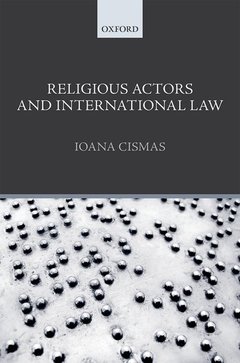Description
Religious Actors and International Law
Author: Cismas Ioana
Language: English
Subjects for Religious Actors and International Law:
Approximative price 173.95 €
In Print (Delivery period: 21 days).
Add to cart
Publication date: 07-2014
Support: Print on demand
Support: Print on demand
Description
/li>Biography
/li>
This book assesses whether a new category of religious actors has been constructed within international law. Religious actors, through their interpretations of the religion(s) they are associated with, uphold and promote, or indeed may transform, potentially oppressive structures or discriminatory patterns. This study moves beyond the concern that religious texts and practices may be incompatible with international law, to provide an innovative analysis of how religious actors themselves are accountable under international law for the interpretations they choose to put forward. The book defines religious actors as comprising religious states, international organizations, and non-state entities that assume the role of interpreting religion and so claim a 'special' legitimacy anchored in tradition or charisma. Cutting across the state / non-state divide, this definition allows the full remit of religious bodies to be investigated. It analyses the crucial question of whether religious actors do in fact operate under different international legal norms to non-religious states, international organizations, or companies. To that end, the Holy See-Vatican, the Organization of Islamic Cooperation, and churches and religious organizations under the European Convention on Human Rights regime are examined in detail as case studies. The study ultimately establishes that religious actors cannot be seen to form an autonomous legal category under international law: they do not enjoy special or exclusive rights, nor incur lesser obligations, when compared to their respective non-religious peers. Going forward, it concludes that a process of two-sided legitimation may be at stake: religious actors will need to provide evidence for the legality of their religious interpretations to strengthen their legitimacy, and international law itself may benefit from religious actors fostering its legitimacy in different cultural contexts.
Ioana Cismas is Scholar-in-Residence at the Center for Human Rights and Global Justice at NYU School of Law. Prior to moving to NYU she was the Coordinator of the Law Clinic at the Geneva Academy of International Humanitarian Law and Human Rights and an OHCHR consultant to the UN Special Rapporteur on transitional justice. She was previously a researcher at the Geneva Academy focusing on the intersection of economic, social and cultural rights and civil and political rights. She provided legal and policy expertise to various stakeholders, including the Swiss Federal Department of Foreign Affairs, and acted as legal adviser to a member of the UN Human Rights Council Advisory Committee. While in Switzerland she focused on corporate complicity in international crimes and humanitarian engagement of non-state actors while working in research institutions and non-governmental organizations.
© 2024 LAVOISIER S.A.S.




